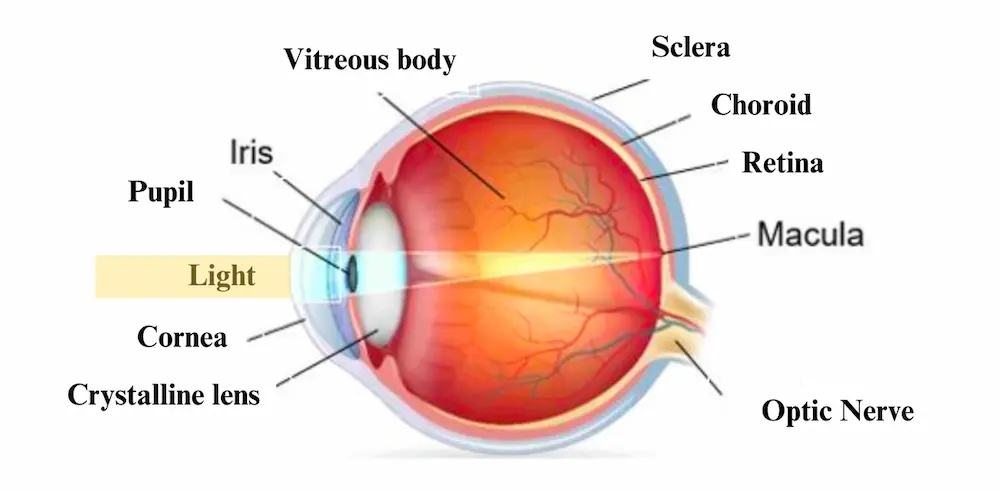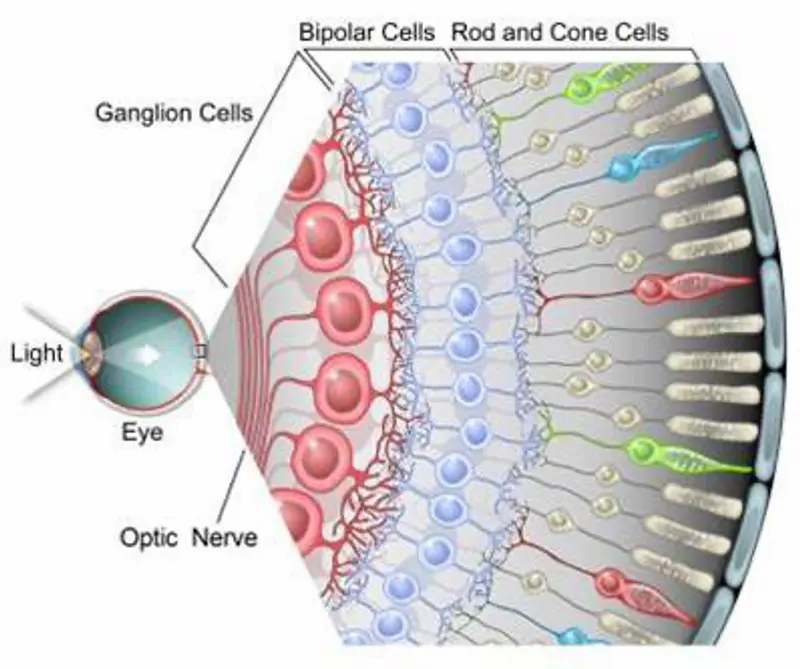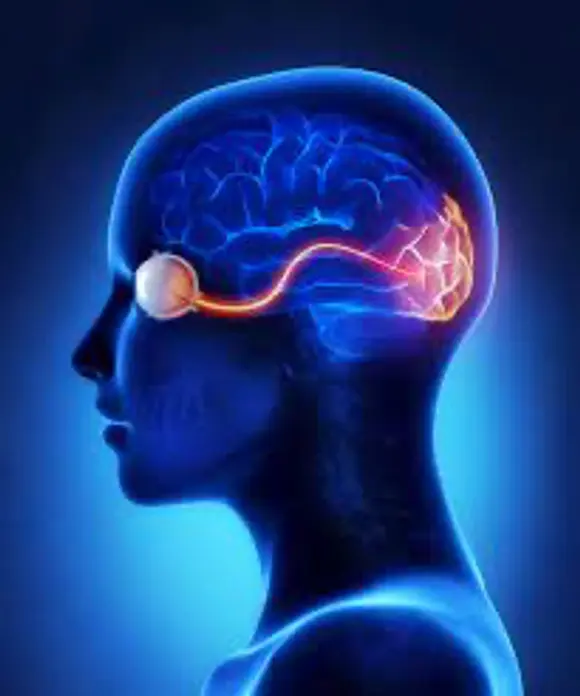The link between Age-related Macular Degeneration (AMD) and Alzheimer's Disease
Age-related Macular Degeneration (AMD) and Alzheimer's disease are two significant health concerns among the aging population. While these conditions primarily affect different organs—the eyes and the brain, respectively—emerging research has suggested a potential link between AMD and Alzheimer's.

Age-Related Macular Degeneration
AMD is a progressive ocular condition that affects the macula, a small but critical part of the retina responsible for sharp central vision. It is the leading cause of visual impairment and blindness among seniors in industrialized countries. AMD manifests in two main forms: dry AMD and wet AMD.

Figure 1. Anatomy of the human eye
- Dry AMD: This form accounts for the majority of AMD cases and is characterized by the presence of drusen, yellow deposits that accumulate beneath the retina. Over time, the accumulation of drusen can lead to the deterioration of retinal cells, resulting in vision loss.
- Wet AMD: Although less common, wet AMD is more severe. It occurs when abnormal blood vessels grow beneath the retina, leading to leakage of blood and fluid. This leakage can cause rapid and severe vision loss if left untreated.
To learn more about the different forms of AMD, its risk factors and to get personalized informations to prevent it, visit www.macutest.com.
Alzheimer's
Alzheimer's disease is a progressive neurodegenerative condition. It affects cognition, memory, and behavior. It is the primary form of dementia in older adults. It worsens memory, thinking, and reasoning. It causes language difficulties and challenges with tasks.
This disease causes problems in the brain, such as the accumulation of abnormal substances called beta-amyloid plaques and tau protein tangles. These disrupt normal brain function, leading to the loss of neurons and synapses.

Figure 2. Progression of Alzheimer’s Disease
This disease has major repercussions on daily life, hampering personal care, recognition of loved ones and navigation in familiar environments. It ultimately impairs overall functioning and independence. Recent research suggests that the neurodegenerative processes in Alzheimer's may also affect other organs and systems, including the eyes.
Retinal Pathology and Cognitive Decline
The retina, which is an extension of the central nervous system, shares certain characteristics with the brain. This connection suggests that retinal changes observed in AMD may have broader implications for cognitive function. Retinal ganglion cells (RGCs) are responsible for transmitting visual signals from the eye to the brain. These cells play an essential role in our ability to see and interpret the world around us.

Figure 3. Retinal ganglion cells
Studies indicate that AMD can lead to the loss of RGCs, potentially impacting the transmission of visual signals. These retinal changes may contribute to cognitive decline since visual impairment can affect daily activities and cognitive processes. Ocular biomarkers, such as retinal imaging techniques, offer promising avenues for early detection of retinal changes associated with neurodegenerative diseases like AMD and Alzheimer's. By examining the retina, researchers can potentially identify signs of cognitive decline and monitor disease progression in a non-invasive manner. This provides valuable insights into the relationship between retinal pathology and cognitive decline.
Analogies between AMD and Alzheimer's disease
AMD and Alzheimer's disease have similarities in how they develop.
Both conditions involve the buildup of certain proteins in the body. These proteins are found in the brain in Alzheimer's and in the retina in AMD. This suggests that there are common processes at work.
Genetic factors contribute to both AMD and Alzheimer's, suggesting a potential connection. Genes like CFH, CFB, ARMS2 (in AMD) and APOE (in Alzheimer's) increase the risk. These genes are involved in processes like inflammation, oxidative stress, cholesterol metabolism, and amyloid-beta clearance. Shared genetic risk factors indicate common pathways. However, lifestyle, environment, and aging also play roles.
Chronic inflammation and oxidative stress, harmful processes in the body, play a role in the advancement of both AMD and Alzheimer's. They can cause damage to the retina and brain tissues.
Both AMD and Alzheimer's are affected by problems with blood vessels. When blood vessels are not working properly, it can harm the retina and brain tissues by reducing the supply of oxygen and nutrients they need.
We have published another article where you can learn more about AMD and blood pressure.
The link between AMD and Alzheimer's disease
Numerous studies have shown that our visual abilities and our brain are closely linked, particularly in the context of dementia and associated pathologies such as Alzheimer's.
A Chinese study conducted on a cohort of almost 12,364 Britons aged 55 to 73 was carried out in 2021. Its results showed that the risk of dementia was increased by 11% for participants with cataracts, 26% for those with AMD, and 61% for patients with diabetes-associated eye disease. A link has also been established between cognitive decline and certain forms of glaucoma.
In addition, a 2022 Taiwanese study of 8,223,581 participants showed that macular degeneration was significantly associated with dementia. Patients with AMD had 1.22 times the risk of developing dementia and 1.21 times the risk of Alzheimer's, compared with patients without macular degeneration. More specifically, the association was greater in cases of dry rather than wet AMD.

Figure 4.The Optic Nerve And Its Visual Link To The Brain
Conclusion
Researchers have established a link between AMD and Alzheimer's disease. Both diseases have similar triggers in the body, such as protein accumulation, genes, inflammation and blood vessel problems. By studying the eyes, doctors can potentially detect cognitive decline at an early stage. Moreover, recent studies have revealed a significant association between AMD and dementia. Patients with AMD have a higher risk of developing Alzheimer's disease, and the association is most pronounced in cases of dry AMD.
To find out more about how you can take action to preserve your vision and prevent AMD, you can visit www.macutest.com where you'll have access to personalized lifestyle recommendations tailored to your real needs.
Bibliography
- K. Kaarniranta, A. Salminen, A. Haapasalo, H. Soininen, et M. Hiltunen, « Age-Related Macular Degeneration (AMD) : Alzheimer’s Disease in the Eye ? » , Journal of Alzheimer’s Disease, vol. 24, no 4, p. 615‑631, mai 2011.
- « What Is Macular Degeneration ? » , American Academy of Ophthalmology, 6 avril 2023.
- Choi, S., Jahng, W. J., Park, S. M., & Jee, D. (2020). Association of age-related macular degeneration on Alzheimer or Parkinson Disease : a retrospective cohort study. American Journal of Ophthalmology.
- « What is Alzheimer’s Disease ? | CDC » .
- « What Happens to the Brain in Alzheimer’s Disease ? » , National Institute on Aging.
- S. J. Woo et al., « Cognitive Impairment in Age-related Macular Degeneration and Geographic Atrophy » , Ophthalmology, vol. 119, no 10, p. 2094‑2101, oct. 2012.
- « Preservation of ganglion cell layer neurons in age-related macular degeneration » , PubMed, 1 mars 2001.
- R. Zhang, X.-W. Gong, W. Ma, L. Wen, Y. Wang, et H. Yao, « A Study on the Correlation Between Age-Related Macular Degeneration and Alzheimer’s Disease Based on the Application of Artificial Neural Network » , Frontiers in Public Health, vol. 10, juin 2022.
- « Screening Alzheimer’s Via the Eye : Blood Vessel Changes May Reveal Early Dementia | BrightFocus Foundation » , 11 novembre 2020.
- « Targeting Age-Related Macular Degeneration » , National Institutes of Health (NIH), 2 juillet 2015.
- « Neurodegenerative conditions : When AMD, Parkinson’s, and Alzheimer’s affect the eyes | Eyes and Vision | UT Southwestern Medical Center » .
- L.-Y. Wen et al., « Increased risk of Alzheimer’s disease among patients with age-related macular degeneration : A nationwide population-based study », mai 2021.
- B. Staff, « Dry AMD Linked to Dementia » , review of optometry, 2 janvier 2023.
The link between age-related macular degeneration (AMD ) and cataracts.
Cataracts and AMD are two health problems that can affect vision, particularly in the elderly. Although cataracts and AMD are different conditions, they have links and similarities. In this article, we'll explore the link between cataracts and AMD, looking at their characteristics, common risk factors and implications for visual health.
The Impact of Physical Activity on Age-related macular degeneration (AMD) : Promoting Healthy Vision
Looking for a little motivation to start your morning jog? What if we told you it could help prevent AMD? In fact, this incurable disease, which is the main cause of poor eyesight in the elderly, could be delayed thanks to physical activity.